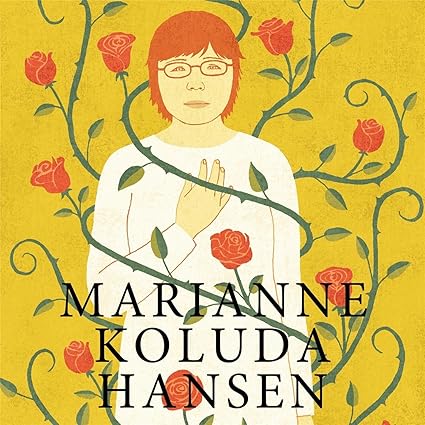A little while ago, I was in contact with poet and translator Michael Goldman, who has translated two collections of poems by Marianne Koluda Hansen. To be honest, I had never heard about Marianne, and this made me regret that there will be no Danish Review this year (the project is not dead, merely in ‘transition’…) for this would have been perfect material.
I have decided, therefore, to post here his short essay about his meeting with Marianne’s widower Søren Andersen in Denmark, as well as links to a poetry reading and his homepage. If you are interested in Danish literature, I really suggest you take a look!
And finally, I hope you will enjoy this as much as I did.
From here (or, actually, from below the line…), it’s all Michael Goldman!
A LETTER CAME
Marianne Koluda Hansen was an author — a forgotten Danish author. She died in February of 2014. That November I went to visit her widower, Søren Andersen, at their home outside Copenhagen, where I was in the city for an international gathering of Danish literary translators. After meeting me at the bus, Søren and I walked past the apartment he and Marianne first lived when they got married 36 years before. It was here she wrote her first book of poems.
After their first child was born they moved a couple of blocks away to a neat and cosy house where she began her career — as an editing consultant for a Danish publishing house, and then as a teacher of English and Danish at a school for adults studying to earn their high school equivalencies. Marianne published her second book of poems in 1980, and then a novel. As we sat in their dining room, over coffee and pastry, Søren told me stories from their life together and showed me a notebook binder of reviews, old newspaper clippings, book contracts and announcements from her brief literary career.
Marianne suffered from emotional swings from the start of their relationship. She was pretty and charming and quite a firebrand. She was the motivational force behind innovative celebrations at the school, she rode her bicycle long distances for work and errands, and she was a dedicated, caring mother. She took medication to help weather her downturns, but it was not always effective. Her students loved her, but there were days when she refused to go to work. She gained weight, lost it, gained it again. Her childhood haunted her. Memories of her parents’ fights, her need to protect her little sister, her attempts to protect her parents from one another, stayed with her, unresolved. Eventually, her work habits became so hampered that she could not teach any longer. Although she still wrote, she repeatedly destroyed her work and foiled Søren’s attempts to rescue it.
After she lost her job, she rarely went out. She slept for long periods and smoked 30 cigarettes a day in an upstairs room where the walls yellowed. Søren did all the shopping, food preparation and household chores. Then she suffered a brain aneurysm followed by three strokes. She lost the use of her left arm, then lost the ability to walk and then the ability to breathe on her own. She lay in the hospital drifting in and out of consciousness.
That is when a letter came from a translator in the US. (That was me). The translator had seen three of her poems in a used anthology from 1979 and was totally taken by them. He asked to be sent her books and he asked for permission to find publishers for her work in English. Søren took the letter with the translated poems to the hospital and read it all to her. He saw how happy she was. She nodded that she wanted Søren to do this for her. Søren left her room.
Fifteen minutes later their son, Kasper, arrived at her bedside. Under the respirator she said, “A letter came.” Those were her last words. She never regained consciousness, and died shortly thereafter.
Now, sitting across from Søren, I handed him ten copies of the audiobook I had produced of Mariannes’s poetry in English translation, to share with their family and friends. I was also able to tell him that nine of my translations of Marianne’s poetry were accepted for publication in journals by Columbia University, Stanford Unviersity, Smith College, SUNY and the International Poetry Review.
I had translated two of her poetry collections in their entirety, and I expressed my hope that one day they would make it into print.
We went upstairs to copy some of the old newspaper clippings for me to take back with me. The copy machine stood on a desk in the room where Marianne had spent her last days before her hospitalization. The walls had been cleaned thoroughly and painted white.
Michael Goldman
Florence, Mass
February, 2015
Live Poetry Reading
BRIEF BIOS
Marianne Koluda Hansen (1951-2014), born on the island of Bornholm, lived most of her life in Copenhagen, Denmark, where she wrote four books of poetry and two novels. She received her teaching degree in 1979 and taught English and Danish at a school for adults for 30 years. Also, she was an artist who held several exhibitions.
Michael Goldman is the founder of Hammer and Horn Productions, which has produced three audiobooks of Danish poetry in English translation, including volumes by Benny Andersen, Knud Sørensen, and Marianne Koluda Hansen. His translations have appeared in 18 journals including The Los Angeles Review, The International Poetry Review and World Literature Today. A licensed contractor, he also plays jazz clarinet. He lives in Florence, Massachusetts, USA.
Website: www.hammerandhorn.net
Facebook: www.facebook.com/pages/Hammer-and-Horn-Productions/1539598769621807